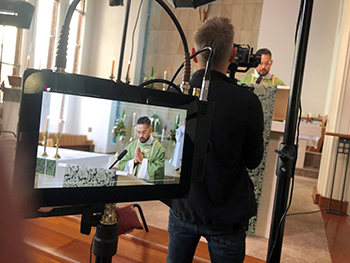The digital revolution is one of the greatest socio-cultural changes the world has ever seen. Like the industrial revolution, it is drastically changing the way we think, live, interact, communicate and even worship. Digital media and technologies have heavily influenced and shaped human society over the past 60 to 70 years and are changing the cultural norms of many communities. The digitalisation of culture offers the Church many new challenges to respond to, as well as a great new avenue for evangelisation.
Over the last few decades or so, you may have read about the rise of the digital age or new digital spaces. You may have read about how the Church has begun to use social media or utilise digital technologies in its worship, in its catechesis and in its efforts of evangelisation. This is all well and good, but current understanding of this phenomenon teaches us that we need to view digital media and technologies as a culture in and of themselves, and not just in terms of their utility.
Contemporary Catholic missiology hopes to avoid the mistakes of the past where the Church dominated culture and instead offers us a new paradigm of mission known as Prophetic Dialogue.
This concept was coined by two missionaries of the Society of the Divine Word, Fr Stephen Bevans SVD and Fr Roger Schroeder SVD. Their purpose of recontextualising missiology for the 21st century was to enable missionaries to better engage with non-European cultures that the Church now found itself in. In essence, however, the missiological paradigm of Prophetic Dialogue can be adapted to any culture, especially the digitalised culture of many modern-day communities.
 According to Bevans and Schroeder, mission needs to be dialogical; it must be prepared to listen before it speaks. The dialogical aspect of mission recognises that the missionary does not bring God with them to the new culture; God is already there. The missionary’s role is simply to support the people of this new culture to recognise the presence of God in the goodness of their own culture. The missionary promotes dialogue between the culture and the Gospel, while prophetically challenging aspects of the culture which may be contrary to the Gospel. Mission as prophetic dialogue incorporates evangelisation within the aspect of witnessing to and proclaiming the Gospel, but extends mission to other areas such as prayer, liturgy, contemplation, works of justice and peace, interreligious dialogue, care for creation, efforts of reconciliation and inculturation.
According to Bevans and Schroeder, mission needs to be dialogical; it must be prepared to listen before it speaks. The dialogical aspect of mission recognises that the missionary does not bring God with them to the new culture; God is already there. The missionary’s role is simply to support the people of this new culture to recognise the presence of God in the goodness of their own culture. The missionary promotes dialogue between the culture and the Gospel, while prophetically challenging aspects of the culture which may be contrary to the Gospel. Mission as prophetic dialogue incorporates evangelisation within the aspect of witnessing to and proclaiming the Gospel, but extends mission to other areas such as prayer, liturgy, contemplation, works of justice and peace, interreligious dialogue, care for creation, efforts of reconciliation and inculturation.
In order for the Church to prophetically dialogue with the digital culture, it must first enter the culture as a foreigner, observe it and learn its ways and customs. Bevans and Schroeder use the image of entering someone else’s garden, being respectful of what is planted there and allowing the gardener themselves to show you around.
In 2002, the Pontifical Council for Social Communications assessed certain aspects of the digital culture in its document Ethics in Internet, stating that the Internet “is instantaneous, immediate, worldwide, decentralised, interactive, endlessly expandable in contents and outreach, flexible and adaptable to a remarkable degree. It is egalitarian, in the sense that anyone with the necessary equipment and modest technical skill can be an active presence in cyberspace, declare his or her message to the world and demand a hearing. It allows individuals to indulge in anonymity, role-playing and fantasising and also to enter into community with others and engage in sharing.
“According to users’ tastes, it lends itself equally well to active participation and to passive absorption into a narcissistic, self-referential world of stimuli with near-narcotic effects. It can be used to break down the isolation of individuals and groups or to deepen it.”[1]
The Church rightly noted the amoral nature of digital technology that in itself is neither good nor bad, but depends on the motives and actions of its users. This is where the Church must encourage all Christians to not differentiate their Christian actions from the real world and the virtual world. Just as we are called to live out the Gospel in our everyday lives, that means we are to live the Gospel in our online activities as well.
What digital evangelisation calls for today is not to build more churches online; we already have plenty of buildings that are empty. The Church is called to build bridges online or, in the language of digital culture, to build networks. Incarnating itself and enculturating itself, the Church can engage in the digital culture itself as a bridge-builder, building connections between people of faith and those seeking to explore faith. In this way, the Church does not explicitly preach, but enables dialogue. The actions of connecting peoples and bringing them together is the prophetic action mirroring the redemptive actions of the Trinity.
Through the model of prophetic dialogue, the Church enters into the reality of human culture, just as Christ was incarnated in human flesh and made his home amongst us. Through the spirit of Pentecost, the Church strives to evangelise best when the Word of God is proclaimed in every cultural reality, allowing the seeds of faith to grow organically from within the culture, in co-operation with the Spirit’s grace. Mission as prophetic dialogue encompasses multiple aspects of the life of the Church, each of which reflects aspects of the missionary nature of the Triune God. The Church, as a gathered people, is called to proclaim its faith in Christ Jesus in every situation.
As the culture of our global village becomes increasingly digitalised, our missionary mandate calls us to enter into the digital culture and, by acknowledging the goodness found there through the interconnectivity of persons, allow the Gospel of Christ to flourish from within. Through the Spirit-led dialogue of the Gospel and the digital culture, we will be amazed to see how the Gospel and the culture can become gifts to one another.
Image: The production of Mass For You at Home (ACBC).
Words: Fr Joshua Nash OMI
 Fr Joshua Nash OMI is the assistant priest as St David’s Parish, Tea Tree Gully, in the Archdiocese of Adelaide. As part of his studies, Fr Nash completed a Masters thesis exploring how the Church can understand its mission in the digital world.
Fr Joshua Nash OMI is the assistant priest as St David’s Parish, Tea Tree Gully, in the Archdiocese of Adelaide. As part of his studies, Fr Nash completed a Masters thesis exploring how the Church can understand its mission in the digital world.
[1] “Ethics in Internet,” Pontifical Council for Social Communications, accessed 21 February 2022, https://www.vatican.va/roman_curia/pontifical_councils/pccs/documents/rc_pc_pccs_doc_20020228_ethics-internet_en.html



